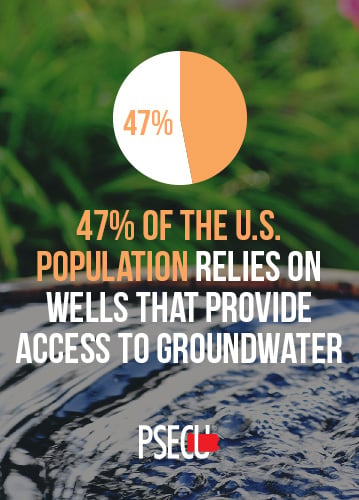 If your home relies on a well for water, there are special considerations to keep in mind. This chapter is designed to provide an overview of wells and groundwater, along with general upkeep information.
If your home relies on a well for water, there are special considerations to keep in mind. This chapter is designed to provide an overview of wells and groundwater, along with general upkeep information.
Well and Groundwater Basics
Up to 47% of the U.S. population relies on wells that provide access to groundwater. If your home uses a well, it’s critical to understand how it works.
At a basic level, wells tap into water below the surface, making it available for use in a home. There are three types of wells, each designed to work best in different situations:
- Dug Wells
Dug wells are created manually — the way they were before modern technology arrived and equipment was developed. If the ground is soft enough and the water table isn’t too far below the surface, wells can be dug by hand. While this occurs less frequently in today’s modern society, it is possible.
- Driven Wells
Driven wells are fairly common, especially in soft ground like sand or gravel. Professionals drive a small pipe into the ground that has a screen attached to filter out sand, gravel and other particles that could contaminate the water. These wells work best in shallow water, but contamination is more likely.
- Drilled Wells
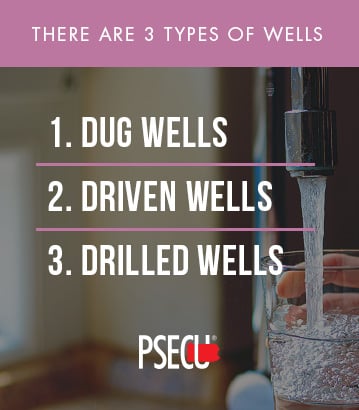 If your home has a well, it is likely a drilled well. With a drill rig, usually mounted on a large truck, a professional will use various rotary drill bits to drill through rock and anything else below the ground. Because of the technology in play, these wells can be drilled much deeper than the first two methods, which means a pump is generally used to help push the water to the surface.
If your home has a well, it is likely a drilled well. With a drill rig, usually mounted on a large truck, a professional will use various rotary drill bits to drill through rock and anything else below the ground. Because of the technology in play, these wells can be drilled much deeper than the first two methods, which means a pump is generally used to help push the water to the surface.
Understanding the type of well on your property helps to determine whether contamination should be a concern, and what other parts — like a pump — may be a part of your setup.
Because a well drives water up from below the earth, regular testing is critical. The National Ground Water Association recommends well water be tested each year to ensure safety and usability.
Water can become contaminated by human practices and behavior, along with naturally occurring elements. The ones that can cause issues with well water include:
- Iron and Manganese. Signs of an iron issue include a rusty or metallic taste in the water, or stains on clothing or fabric. Water softeners, aeration, filtration and chlorination can help treat water affected by iron.
- Nitrogen. When nitrogen is in ground water, it usually comes from the atmosphere. This nitrogen attaches to plants and is driven into the ground by their roots. Fertilizers can also add nitrogen to the ground. You’ll most often find nitrites, nitrates and ammonia in groundwater. Nitrates can be toxic, especially to young children, so water treatment is essential. Reverse osmosis systems and water softeners can help prevent trouble, but removing the source of the pollutant should be a top priority.
- Sulfur. Sulfides are naturally occurring in soil, especially in areas rich with limestone. Often, a “rotten egg” smell is the first indication of sulfur’s presence. Aeration, hydrogen peroxide and other methods recommended by a professional can help to lessen its impact. A filtration system is generally recommended as well.
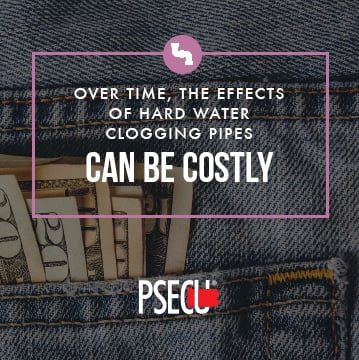 One of the most common areas of trouble for well owners is hard water. It’s usually caused by an overabundance of calcium and magnesium that has dissolved into the water. While it doesn’t lead to health problems or concerns, it can clog pipes over time, decreasing the life of toilet units and water taps.
One of the most common areas of trouble for well owners is hard water. It’s usually caused by an overabundance of calcium and magnesium that has dissolved into the water. While it doesn’t lead to health problems or concerns, it can clog pipes over time, decreasing the life of toilet units and water taps.
Treatment options include:
- Chemical softeners
- Filters
- Mechanical softeners
- Magnetic water softeners
To understand which treatment is best for your home and water use, speaking with a plumbing professional may be a wise first step. Hard water may not feel like a problem when you first notice it, but over time, the effects of hard water clogging pipes can be costly on your budget.
Maintaining Your Well: Tips for Homeowners
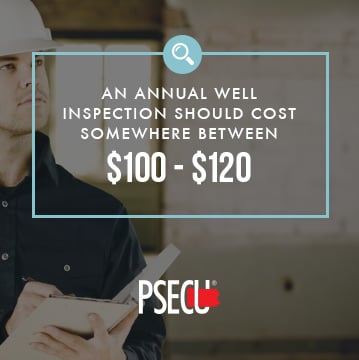 When drilled and installed correctly, wells are designed to last indefinitely, providing the water table stays at the same level as the well. However, certain components — like well pumps — do have shorter life spans.
When drilled and installed correctly, wells are designed to last indefinitely, providing the water table stays at the same level as the well. However, certain components — like well pumps — do have shorter life spans.
If you’re a homeowner with a well, it’s important to understand that most submersible well pumps are designed to last up to 25 years. This number is just an average, though. Sediment and untreated water can shorten this lifespan considerably.
To keep a well pump functioning at its highest level, regular maintenance and inspections are recommended. An annual inspection should cost somewhere between $100 and $120. As with most other home maintenance costs, money spent on prevention can save you in the future.
Signs your well or its components may need extra attention outside of scheduled maintenance and inspections include:
- Dirty water
- Loud noises coming from the faucet or the well itself
- Air bubbles or pockets “spitting” from the faucet
- Electric bills that are higher than normal
Additionally, issues with the water tank, as outlined in Chapter 2, may also indicate trouble, since the two systems work together.
To prepare for repairs that may become necessary in the future, there are a few specific costs to keep in mind. Remember, however, that regular maintenance might prevent the need for these repairs, while extending the life of the well and its pump.
Common repairs include:
- Replacing the pressure switch: $20-$40, plus the cost of the service call
- Replacing the expansion tank: $250-$500, plus installation costs
- Replacing the well pump: $1,000-$2,000, depending on the depth of the well and factors that could complicate the process
Keeping your water both contaminant-free and functioning at its best should be a top priority. To enable this, schedule regular testing and maintenance, and pay attention to signs of trouble.
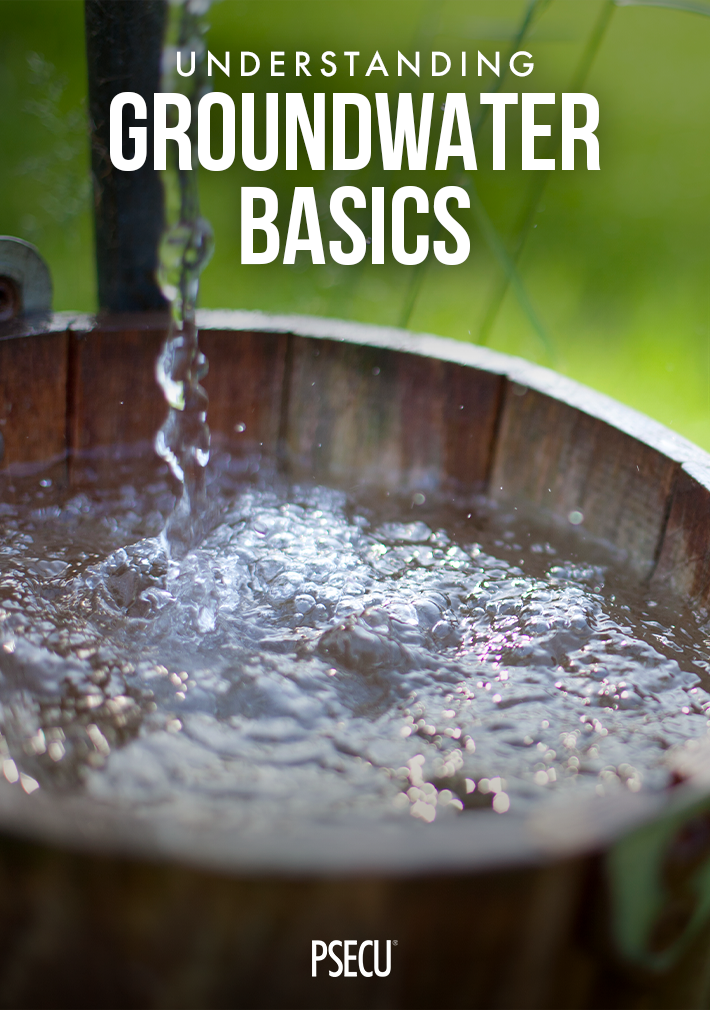
Read our other chapters
Chapter 1
Why Maintenance Matters and How to Budget for It
Chapter 2
Plumbing Maintenance — From Snaking a Main Drain to Dealing with Hard Water Clogs
Chapter 3
Well Maintenance — Water Well Maintenance Starts With Understanding Groundwater Basics
Chapter 4
Septic Tank Maintenance — Preventative Care for Your Tank and Spotting Warning Signs
Chapter 5
Sewer Line Maintenance — From Understanding How Systems Work to Spotting Clogs
Chapter 6
HVAC System Maintenance — Keeping Your Home Comfortable Throughout the Year
Chapter 7
Insulation — Better Insulating Your Home and Preventing and Addressing Drafts
Chapter 8
Home Exterior Maintenance — Saving Costs by Identifying Seasonal Tasks
Chapter 9
Home Improvement Ideas — Adding Value to Your Home and Getting a Return on Your Investment
Download all chapters as a PDF.
The content provided in this publication is for informational purposes only. Nothing stated is to be construed as financial or legal advice. Some products not offered by PSECU. PSECU does not endorse any third parties, including, but not limited to, referenced individuals, companies, organizations, products, blogs, or websites. PSECU does not warrant any advice provided by third parties. PSECU does not guarantee the accuracy or completeness of the information provided by third parties. PSECU recommends that you seek the advice of a qualified financial, tax, legal, or other professional if you have questions.
